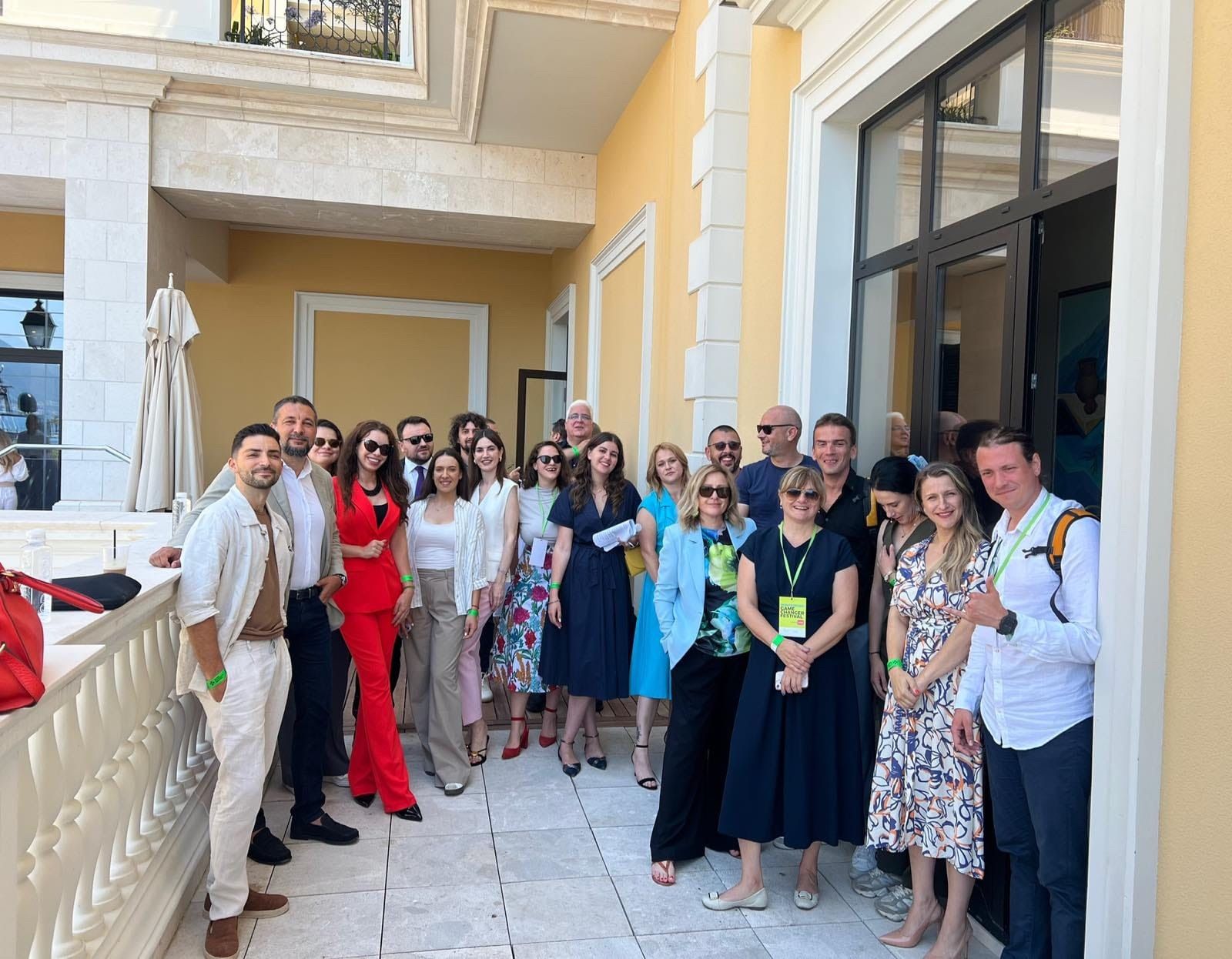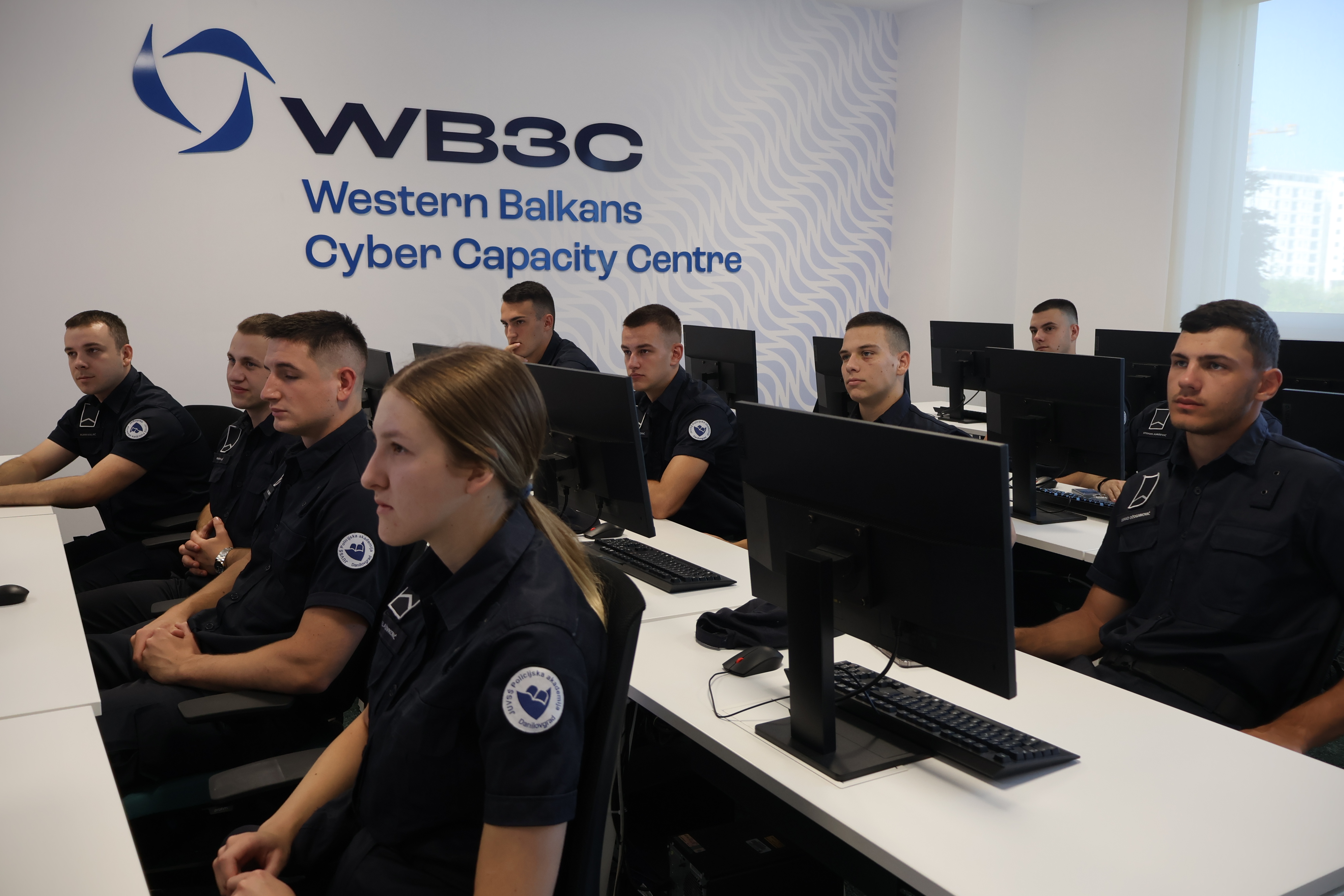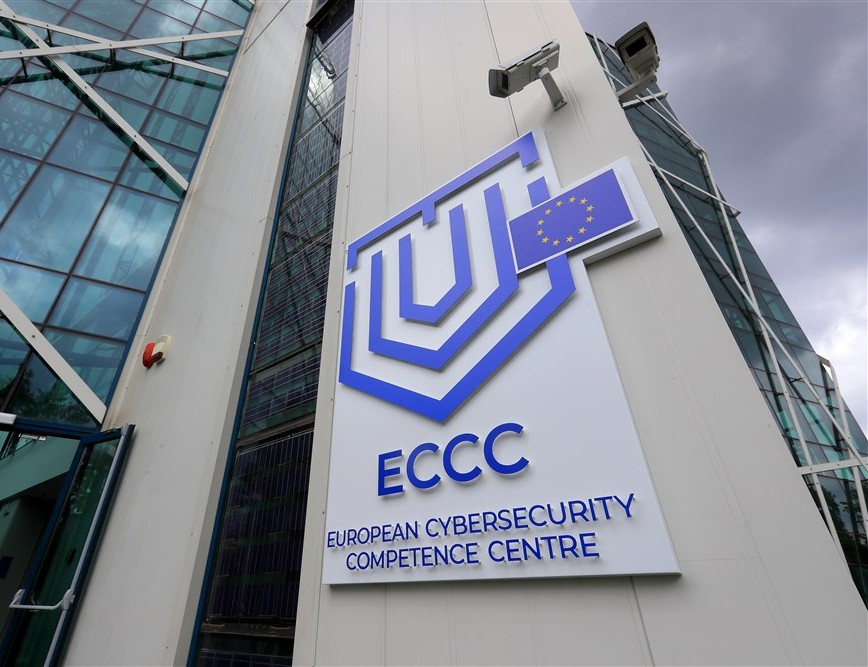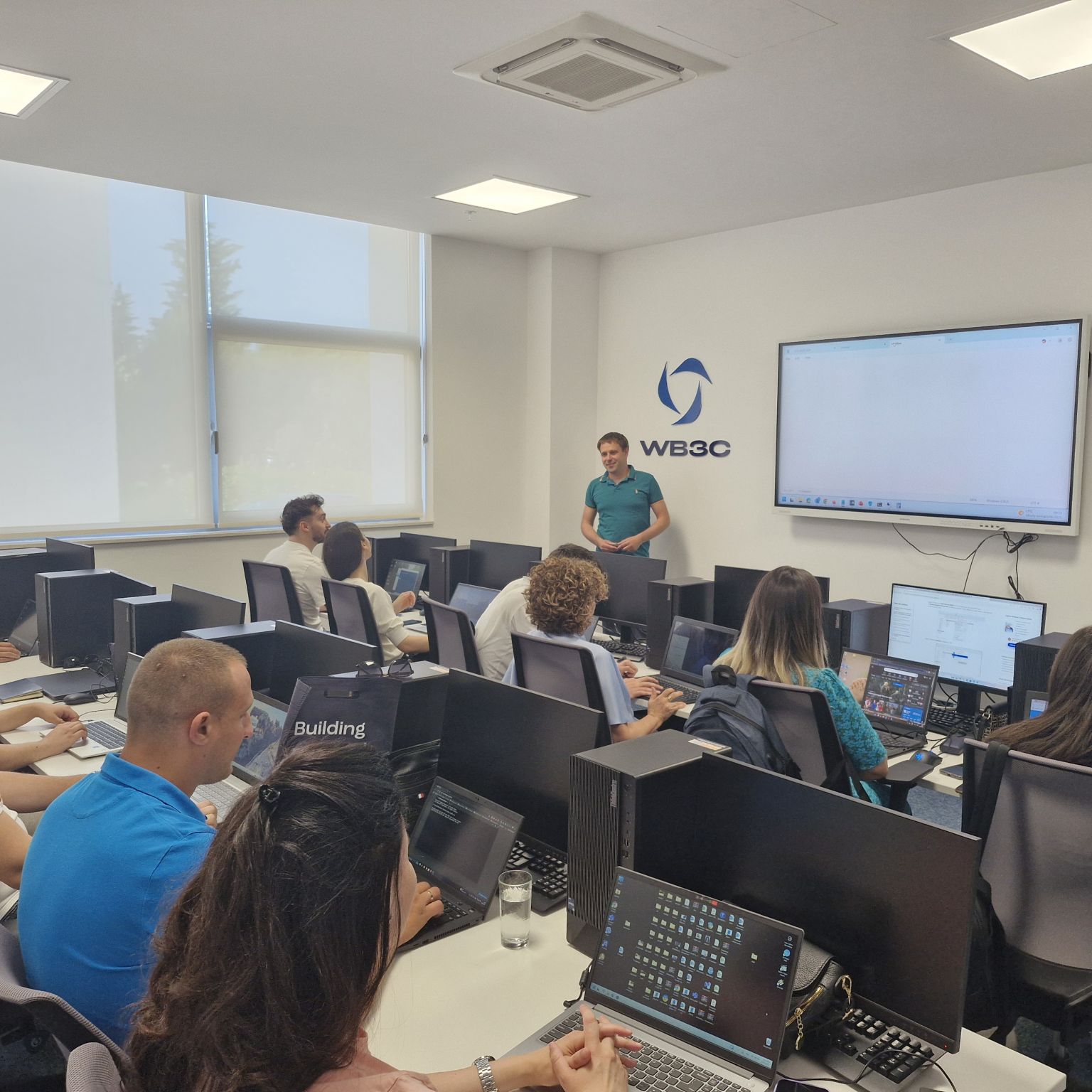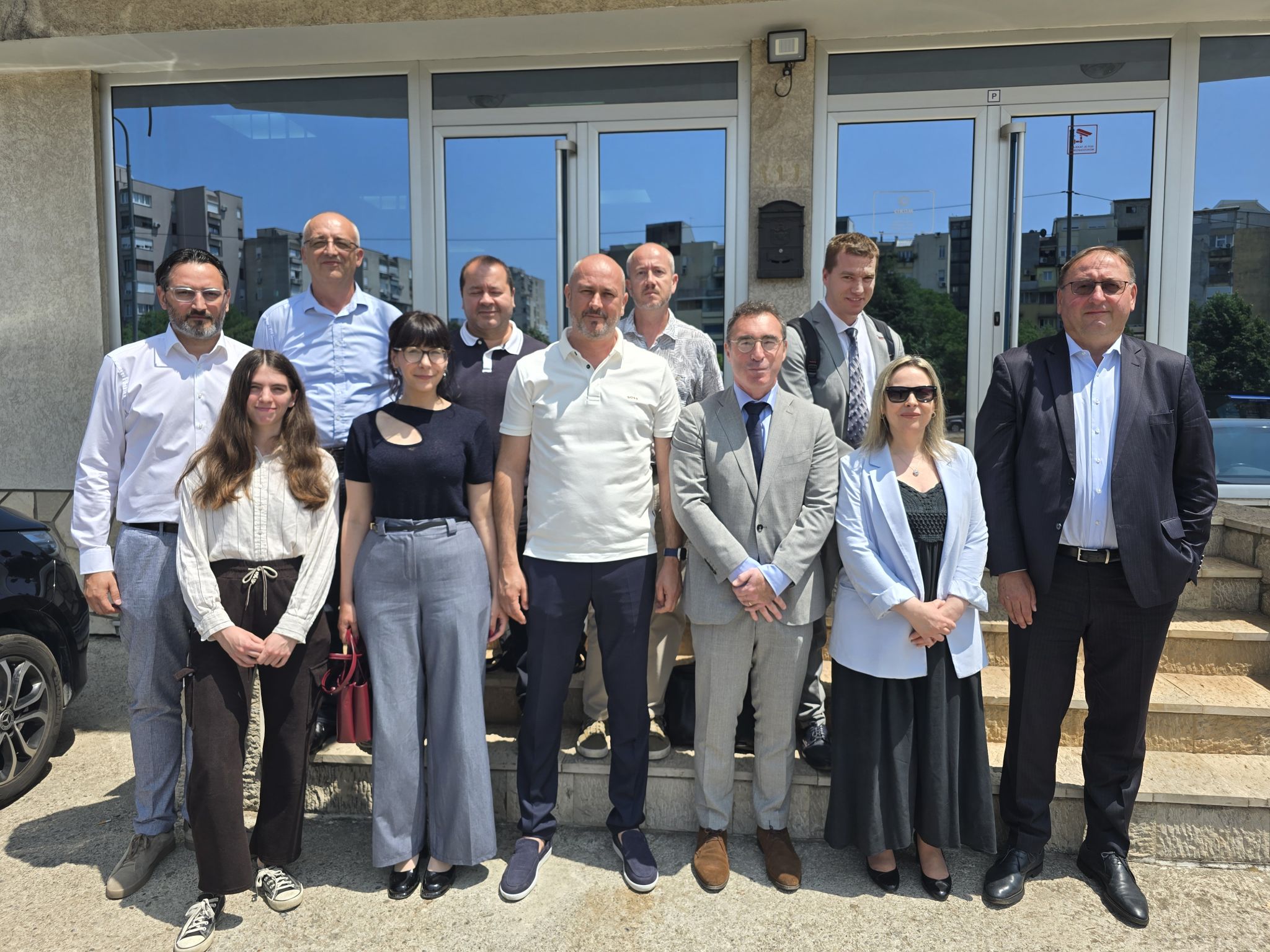04.07.2025
Cyber Capacity Building: Towards a Sustainable Digital Security in Montenegro
WB3C participated in a roundtable on approaches to building sustainable cyber resilience in Montenegro, held as part of the GAME CHANGER Festival 2025 in Porto Montenegro, organized by Women4Cyber Montenegro.
The roundtable, titled “Cyber Capacity Building: Towards a Sustainable Digital Security in Montenegro”, brought together representatives from the public sector, academia and industry to explore long-term strategies for strengthening Montenegro’s cybersecurity ecosystem.
Representing the Centre, Senior Project Manager Vanja Madzgalj MBE contributed on behalf of WB3C, which works to advance cyber capacity across the Western Balkans through structured training, regional cooperation and strategic alignment with EU standards.
She emphasized that, beyond technical training and skills development, institutions must adopt a systemic approach to building cyber resilience. Cyber capacity building should be treated as a ChangeManagement process, especially within the public sector, with strong leadership support at every level and streamlined internal communication that promotes adoption of new technologies and new practices. Besides a robust and structured training plan, leadership and communication are essential for achieving sustainable capacity and resilience.
The roundtable gathered voices from the public sector, academia and industry, reflecting the need for cross-sector collaboration in strengthening Montenegro’s cyber ecosystem.
We thank Women4Cyber Montenegro and all participants for creating a space for meaningful dialogue and cooperation. The panel agreed that such cross-sector discussions should continue as they bring valuable insights into ways forward for securing lasting institutional capacity and resilience.
03.07.2025
Donor Coordination Meeting Strengthens Cybersecurity Support in the Western Balkans
On the margins of the CyberPulse 2025 conference hosted by the Regional Cooperation Council (RCC) jointly with Western Balkans Cyber Capacity Centre, DG ENEST convened its regular Donor Coordination Meeting.
The meeting gathered senior officials, donors, beneficiaries, international organizations and regional experts to align cyber capacity-building efforts in the Western Balkans, ensuring that support is coordinated, complementary and responsive to regional needs.
Key Highlights
- Launch of the IISG Cybersecurity Database – a new mapping tool that identifies ongoing projects, donor contributions and unmet needs in the region. The database will serve as a practical resource for avoiding duplication and guiding the allocation of resources.
- Priority alignment – open exchanges between donors and beneficiaries helped to harmonize priorities and optimize international support across key areas such as cybersecurity, cybercrime and cyber diplomacy.
- Strategic coordination – participants emphasized the need for regular use of the IISG Cybersecurity Database to track initiatives, identify gaps and ensure that new projects respond to real needs.
Way Forward
- Donor monitoring: keep track of active contributors (EU, Council of Europe, OSCE, USA, the Netherlands and others) and their respective areas of intervention.
- Internal follow-up: establish a register of donor projects based on the IISG Database and synchronize future initiatives with RCC and WB3C coordination efforts.
- Visibility and synergies: ensure WB3C projects are included in the IISG Database to enhance regional cooperation.
The Donor Coordination Meeting underlined the importance of structured collaboration and transparency, setting the stage for stronger, better aligned and more impactful cyber capacity-building initiatives in the Western Balkans.
Following the broader Donor Coordination Meeting, DG ENEST convened a focused session with leading implementing partners in the region—including WB3C, ENISA, the e-Governance Academy, the Council of Europe and RCC—to explore how to maximize impact through closer collaboration and coordination. WB3C used this opportunity to present its comprehensive multi-year training programme across its three pillars, several of which are delivered jointly with partners. In parallel, WB3C is leading ongoing negotiations with DG ENEST on funding our regional programmes, reinforcing our role as a central hub for cyber capacity building in the Western Balkans.
02.07.2025
RCC CyberPulse 2025: Regional Stakeholder Join Forces in Cybersecurity
The High-Level Western Balkans Cybersecurity Conference – CyberPulse 2025: Tracking Progress, Building Resilience, Driving Change – gathered government representatives, EU institutions, regional organizations, cybersecurity experts and private sector leaders to address the growing cyber threat landscape in the Western Balkans.
CyberPulse 2025 focused on three priorities:
- addressing current gaps in regional cyber capacities,
- exploring the role of emerging technologies, and
- operationalising joint initiatives and partnerships.
Opening Remarks
The conference opened with high-level messages of commitment to regional cyber resilience:
- Amer Kapetanović, Secretary General of the RCC, highlighted the sharp rise in cyber incidents and stressed that trust, political will and coordinated regional action are the strongest “firewall” against threats. He also announced the development of the new regional cybersecurity needs database.
- Filip Ivanović, Deputy Prime Minister of Montenegro for Foreign and European Affairs, emphasized Montenegro’s adoption of European cybersecurity standards and its vision of a secure, resilient digital future as part of EU integration.
- Michael Docherty, speaking on behalf of the European Commission Delegation, reaffirmed EU support for the region through initiatives with ENISA and the Council of Europe, underlining that cybersecurity is now a central element of the EU Growth Plan for the Western Balkans.
- Gilles Schwoerer, Head of WB3C, noted that while digital transformation offers many opportunities, it also expands the attack surface, underscoring the urgent need for secure digital pathways and collective resilience.
Conference Panels
- High-Level Panel: Stronger Connectivity, Smarter Security, Resilient Future (moderated by Danijela Gačević, Head of the Programme Department, RCC)
Senior government representatives from the region exchanged views on national priorities, institutional capacities, and EU integration in the field of cybersecurity.- Governments stressed the shortage of cybersecurity professionals as a critical challenge.
- Kosovo*’s representative emphasized dependence on external consultants and the need to train public servants internally.
- Montenegro focused on intersectoral cooperation and the role of NATO and EU support.
North Macedonia presented its new Ministry for Digital Transformation and its national cybersecurity strategy.
Panelists:
- Bardhyl Dobra – Deputy Minister of Internal Affairs, Pristina
- Naim Gjokaj – State Secretary, Ministry of Public Administration, Podgorica
Radoslav Nastasijevikj Vardjiski – Deputy Minister for Digital Transformation, Skopje
- Navigating Cyber Threats in the Western Balkans: The Evolving Role of AI and Emerging Technologies (moderated by Mirza Jamaković, Prosecutor's Office Sarajevo)
Experts from Europol, law enforcement, and the private sector discussed the opportunities and risks of AI, from forensic tools to the misuse of generative AI by organized crime groups.- Europol described using machine learning to analyze millions of data points in criminal investigations.
- Concerns raised about organized crime groups developing their own AI tools, including large language models, for cybercrime.
- Calls for explainable and transparent AI outcomes in cybersecurity decision-making.
Oracle warned against uploading confidential data into public AI tools, stressing regulatory gaps.
Panelists:
- Emmanuel Kessler – Europol
- Jelena Zelenović Matone – WomenCyberForce / Women4Cyber
- Nenad Bogunović – Cybercrime Unit, Belgrade
Amar Dedović – Oracle
- Empowering Talent: Skill-Building for the Future in the Western Balkans (moderated by Andreja Mihailović, Women4Cyber Montenegro)
The session focused on education, workforce shortages, women’s participation in cybersecurity, and ways to redirect youth talent from informal digital activities to formal opportunities.- Highlighted that women’s participation in cybersecurity remains below 20% in the Western Balkans.
- Croatia shared progress from 30% to 52% female participation in the UN Cybersecurity Working Group between 2019 and 2024.
- Albania’s Cybersecurity Agency argued for education reform starting at primary school.
Open Society Foundation raised concerns about youth involvement in grey/illegal digital activities, calling for redirection into formal sectors.
Panelists:
- Tamara Tafra – Deputy Minister of Foreign and European Affairs, Zagreb
- Igli Tafa – Director, National Cybersecurity Agency, Tirana
- Andi Dobrushi – Open Society Foundation
Fabio di Franco – ENISA
- Integrating Experience and Strategy: A Multisector Dialogue on SOC Advancement (moderated by Vanja Madžgalj, WB3C)
Panelists shared good practices for building and operating Security Operations Centres, stressing the importance of policy alignment, inter-sectoral cooperation and trust-building between public and private actors. - Albania’s national experience showed that the 2022 cyberattack became a catalyst for building SOC capacity and adopting “zero trust” and defense-in-depth strategies.
- Differences between public and private sector approaches to threat intelligence were emphasized, with trust and data-sharing seen as barriers for public institutions.
North Macedonia introduced a new law placing the Ministry for Digital Transformation as the central cybersecurity authority.
Panelists:
- Franc Zyliftari – Head of Incident Response Team, Tirana
- Philippe Gillet – Gatewatcher, Paris
Aleksandar Acev – Cyber Balkans, Skopje
- Sectors United Against Cyber Threats: Building Bridges Across Sectors (Milan Sekuloski, e-Governance Academy, Tallinn)
This discussion brought together public institutions, civil society, academia, and the private sector, highlighting how multi-stakeholder collaboration is essential to strengthening regional resilience.- Pristina shared good practices in bringing all relevant actors together regularly on critical infrastructure protection.
- Civil society organizations were recognized as important but vulnerable actors requiring targeted cyber hygiene tools and support.
- SMEs were highlighted as particularly exposed, requiring systemic support from the public sector.
The EBRD linked its investment strategy to cybersecurity, showing that infrastructure projects cannot be sustainable without integrated cyber risk management.
Panelists:
- Lulezon Jagxhiu – Prime Minister’s Cabinet, Pristina
- Predrag Puharić – Cybersecurity Centre of Excellence, Sarajevo
- Ivona Dabetić – NGO Secure, Podgorica
- Roy Yarom – European Bank for Reconstruction and Development (EBRD)
The conference concluded that cybersecurity in the Western Balkans can no longer be treated as a purely technical issue but must be recognized as a strategic priority, requiring long-term cooperation, sustained investment and coordinated regional action.
23.06.2025
Digital skills for cadets of the Montenegro Police Academy
This week, WB3C is delivering a tailored training on Open-Source Intelligence (OSINT) for the second group of 10 cadets from the Police Academy in Danilovgrad, Montenegro. The training follows a recent WB3C visit to the Academy to better understand its curriculum and infrastructure needs.
With limited coverage of digital investigation methods in the Academy’s existing curriculum, WB3C has launched a series of hands-on sessions to build critical skills in cyber-enabled policing. A third group is already scheduled for training in December.
The training was opened by Academy Director Nenad Vojinovic and Head of WB3C Gilles Schwoerer, who explained the importance of digital skills in criminal investigation today and encouraged the cadets to embrace the digital dimension of modern law enforcement.
The course is highly practical and interactive and provides the cadets with techniques to find, extract and preserve open-source evidence in lawful ways. The training is led by WB3C in-house trainers Yannick Casse of the French Gendarmerie and Cyril C. of the French National Police who have substantial experience in the field.
WB3C is very pleased to be able to develop this relationship with the Montenegro Police Academy and contribute to the development of national capacities in tackling cyber crime.
20.06.2025
WB3C Mission to Sarajevo
As part of its ongoing commitment to strengthening regional cooperation in cybersecurity, the Western Balkans Cyber Capacity Centre (WB3C) conducted a two-day mission to Sarajevo on 19–20 June.
The visit focused on engaging key national stakeholders who are already benefiting from WB3C training programmes, as well as identifying opportunities for deeper collaboration.
WB3C met with the Council of Ministers of Bosnia and Herzegovina, the Delegation of the European Union, and the Directorate for European Integration to discuss the Centre’s strategic role in supporting regional capacity building and BiH’s participation in EU-aligned cyber initiatives. These discussions emphasized the importance of shared ownership, sustainability, and the active involvement of beneficiary institutions in shaping the Centre’s future direction.
As a follow-up to our May dialogue, WB3C also held a productive meeting with the Centre for Judicial and Prosecutorial Education of the Federation of Bosnia and Herzegovina to assess ongoing training needs and explore tailored programme development for judicial actors.
17.06.2025
WB3C Meets Key Cybersecurity Partners in Bucharest
In a series of high-level meetings held in Bucharest on 16–17 June, Gilles Schwoerer, Head of the Western Balkans Cyber Capacity Centre (WB3C), engaged with several key international stakeholders to explore new avenues of cooperation in the cyber domain.
During the visit, Mr. Schwoerer met with representatives of the Cybercrime Programme Office of the Council of Europe, the European Cybersecurity Competence Centre (ECCC), the UK Foreign, Commonwealth & Development Office (FCDO) – Regional Office, and the Palo Alto Networks South East Europe Office.
Highlights from the visit include:
- With ECCC, WB3C explored the possibility of co-organizing a regional seminar for cybersecurity agencies in the Western Balkans in 2026.
- Discussions with the Council of Europe focused on aligning and coordinating ongoing cybercrime-related initiatives across the region.
- The meeting with Palo Alto Networks explored potential synergies, including integrating their remote learning content into the WB3C Moodle-based training platform.
- With the FCDO Regional Office, talks continued on future collaboration under the cybersecurity pillar, building on earlier exchanges.
These meetings reflect WB3C’s proactive approach to fostering strategic partnerships and reinforcing regional cyber capacity through cooperation, shared expertise, and technology-enhanced learning.
12.06.2025
Cybersecurity training for government CIRTs
In cooperation with Urad Vlade Republike Slovenije za informacijsko varnost (URSIV), WB3C hosted a three day cybersecurity training (10-12 June 2025) for government CIRT professionals from across the Western Balkans. The training focused on cyber threats, incident response and risk management, equipping government IT staff with the tools and knowledge to better protect public institutions and national digital assets.
On Day 3, the national cybersecurity professionals engaged in a practical Capture the Flag (CTF) exercise designed to strengthen incident response capabilities through a live simulated attack.
Why CTFs work as training model?
✔️ Stress-test readiness: Defending systems while clock is ticking
✔️ Unscripted collaboration: Cross-agency teamwork in crisis
✔️ Skills validated, not just taught: Flags are captured and threats neutralized!
CTF demonstrates how immersive simulations bridge theory and practice with controlled real-world scenarios, and build coordinated response protocols. Most importantly, they identify capability gaps in a risk-free environment.
Once again, thank you to our partner Urad Vlade Republike Slovenije za informacijsko varnost (URSIV) for joining Western Balkans Cyber Capacity Centre (WB3C) in our efforts to support the region, our trainer Gregor Spagnolo, as well as our dedicated participants representing five WB governments.
11.06.2025
Study visit to Čikom SOC team
WB3C organized a study visit to Čikom, one of the leading ICT companies in Montenegro, on 11 June 2025, bringing along our partners from the University of Technology of Troyes (UTT), France and the National Cybersecurity Agency of Slovenia (URSIV), as well as the 15 course participants of the Digital Forensics training programme, to demonstrate how a SOC team works. We used this opportunity to promote the need for establishing operational exchanges between SOCs and law enforcement to our students, but also to promote our degree programme on digital investigations for police officers to our Čikom partners from the private sector.
The visit provided an opportunity for Čikom and WB3C to identify areas of cooperation in the cybersecurity pillar including identifying young talent and building public-private partnerships, all aimed at strengthening cyber resilience in the region. Čikom will provide internship to a student of the University of Caen, France this summer and we are grateful for their readiness to support young talent and provide them with the necessary work experience.
06.06.2025
Empowering Albania’s institutions to fight cybercrime
This week, Western Balkans Cyber Capacity Centre (WB3C) partnered with UNDP Albania to deliver an intensive Open-Source Intelligence (OSINT) training for 20 law enforcement officers and prosecutors from across Albania.
Led by a French expert from Office Anti-Cybercriminalite (OFAC) the session equipped participants with techniques to gather, analyze and leverage publicly available information for complex cybercrime investigations.
Why this matters?
Combatting cybercrime is a core strategic pillar for us. Strengthening the capabilities of regional institutions to investigate and prosecute digital threats is vital both for the security, economic prosperity and the European integration of the region.
A huge thank you to:
• The committed Albanian officers and prosecutors for their proactive engagement
• UNDP Albania for their invaluable partnership
• Our OFAC expert for sharing critical expertise and real-world insights.
This week, Western Balkans Cyber Capacity Centre (WB3C) partnered with UNDP Albania to deliver an intensive Open-Source Intelligence (OSINT) training for 20 law enforcement officers and prosecutors from across Albania.
Led by a French expert from OFAC (Office of Foreign Assets Control), the session equipped participants with techniques to gather, analyze and leverage publicly available information for complex cybercrime investigations.
Why this matters?
Combatting cybercrime is a core strategic pillar for us. Strengthening the capabilities of regional institutions to investigate and prosecute digital threats is vital both for the security, economic prosperity and the European integration of the region.
A huge thank you to:
• The committed Albanian officers and prosecutors for their proactive engagement
• UNDP Albania for their invaluable partnership
• Our OFAC expert for sharing critical expertise and real-world insights.
